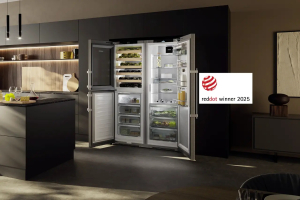
When it comes to kitchen appliances, the oven is one of, if not the most used. From baking to roasting, it's definitely one of the more reliable tools you will ever need. And if you're shopping for one right now, you would have probably realized that it's difficult to choose between a gas and an electric oven.
So, how do you choose the perfect fit? Fret not. While there's no one-size-fits-all answer, this guide will help you understand what works best for your cooking style, your budget, and your home.
How Gas Ovens Heat Up

Gas ovens use either natural gas or propane. A flame ignites at the base of the oven to heat it up. You can see the flame when it's running, and you'll notice how fast it kicks on. That responsiveness is one of the main things people love about cooking with gas. You turn the dial, and the temperature reacts almost instantly, which means there's no waiting around for the oven to catch up.
How Electric Ovens Heat Up

Electric ovens use metal coils that heat up when electricity flows through them. These coils are usually placed at the top and bottom of the oven interior, and they radiate heat outward into the cooking space. They take a little longer to get going, but once they're hot, they stay hot. For dishes that need even heat, like cookies, cakes, and casseroles, this appliance is usually the better bet.
Why Cooks Prefer Gas Ovens
Gas ovens are often the top pick of chefs and home cooks whose main priority is the kitchen appliance's responsiveness.
Advantages:
-
Fast heat-up time: minimal wait time for preheating to the ideal temperature
-
Easily adjustable temperature: flame instantly switches on and off with no delays
-
Versatility: applicable to all types of cookware
-
Moist cooking environment: prevents dishes from drying out, perfect for roasting
Disadvantages:
-
Uneven cooking zones: heat distribution may not be consistent, leading to burned edges but undercooked centers.
-
Risk of leaks: They may release carbon monoxide into the air, making them unsuitable for certain areas (e.g., condos) with limited ventilation.
-
High humidity: Extra moisture increases humidity which may not ideal for kitchens in warm climates such as the UAE
Why Bakers Prefer Electric Ovens
Electric ovens are known for providing even heat, making them ideal for bakers who need to maintain precise and stable temperatures to yield desired results.
Advantages:
-
Set it and forget it: once preheated, they tend to maintain the set temp without much fluctuation.
-
Dry heat: ideal for recipes where you want that golden-brown, crisp top layer
-
Safety: no open flames or risk of leaks, which is ideal for homes with kids or pets.
Disadvantages:
-
Slow response time: Electric coils may take time to heat up and cool down
-
Power interruptions: Unusable when you lose power
Here's a table comparison when choosing between a gas vs. electric oven:
Feature |
Gas Oven |
Electric Oven |
Preheat Speed |
Flame heats instantly |
Coils need time to warm up |
Heat Consistency |
Less even, may have hot spots |
Very even, great for baking |
Moisture Output |
Ideal for roasts, less crisp |
Perfect for crispy results |
Running Cost |
Lower in the UAE, gas is often cheaper |
Higher, but efficient for long cooking |
Installation |
Needs a gas line, professional setup |
Simple and requires a 240V outlet |
Safety |
Flame and gas risks; needs a CO detector |
Safer; no flame or gas leaks |
Maintenance |
Requires more upkeep, burner cleaning, and safety checks |
Simple to clean and maintain |
Installation and Cost Considerations
Choosing between a gas oven and an electric oven involves practical factors like setup, energy costs, and upkeep, especially in UAE homes. These considerations help you decide which oven fits your kitchen and budget.
Setting Up
If your home already has a gas line in place, installing a gas oven is usually straightforward. But if not, that line will need to be added, which means there's a need to bring in a licensed contractor and potentially secure permits. That could cost a few hundred dollars or more, depending on your layout.
It's also important to check with your building management before buying this appliance, especially if you live in a relatively new high-rise development.
Electric ovens have fewer setup requirements. As long as you have the right outlet, it's essentially plug and play. And because most newer homes are wired for 240-volt appliances, this is often the easiest route for installations or kitchen remodels.
Energy Cost Over Time
This part really depends on your local utility rates. In many places, natural gas is cheaper than electricity, so gas ovens may cost less to operate. But electric ovens are often more efficient in how they use and retain heat, especially for long cooking sessions. If you cook frequently, checking local rates and/or using a calculator could help you make a more cost-conscious choice.
When it comes to running costs, electricity is generally more expensive than natural gas, and many residential buildings are already set up with centralized gas lines.
Similarly, you may also check with other providers, such as the Sharjah Electricity, Water and Gas Authority (SEWA) and Abu Dhabi Distribution Company, if you reside in Sharjah and Abu Dhabi, respectively.
Maintenance
Day to day, electric ovens are generally simpler to maintain. There's no flame, and they have fewer moving parts. Cleaning is usually easy because it's just a matter of wiping down the interior and occasionally checking the heating components.
Gas ovens require a bit more attention. Burners can get clogged, and igniters can wear out over time. And because they use combustible fuel, there's a small but real risk of gas leaks caused by faulty parts or poor maintenance.
Gas vs. Electric Oven: Which One Is the Right Choice for You?
Here's the honest answer: it depends on many factors, such as how you cook, what you like to make, your current kitchen setup, your level of busyness, and your location, among others.
If you're a hands-on cook who likes to work with high heat, change temperatures quickly, or get a roast going in no time, gas might be a better fit, especially if your kitchen already has a gas hookup.
If you love baking and grilling, prefer consistent results, or want an appliance that's simple to install and maintain, an electric oven could be the smarter option. It also makes more sense for smaller households or those living in apartments, where ease and safety are more important.
Whichever you choose, consulting a trusted appliance provider such as MVP Appliances can help you find the best solution tailored to your needs and space.
Frequently Asked Questions
Which oven is more energy-efficient in Dubai, gas or electric?
Gas ovens are usually more cost-effective in Dubai due to lower natural gas rates compared to electricity.
Is a gas oven better for cooking large meals or family gatherings?
Gas ovens are ideal for large meals because they preheat quickly and handle high heat well.
Should I avoid gas ovens if I love baking?
Electric ovens are better for baking, providing consistent, dry heat for even rising and browning.
Can I install a gas oven in a Dubai apartment?
Gas oven installation depends on your building's gas connections and safety regulations, so check with management.
Which oven is safer for homes with children?
Electric ovens are safer for kids, with no open flame or gas leak risks, often featuring child-lock settings.
Which oven cooks food faster?
Gas ovens cook faster, as their flame heats up instantly, making them perfect for quick roasting or high-heat dishes.






